Related Research Articles
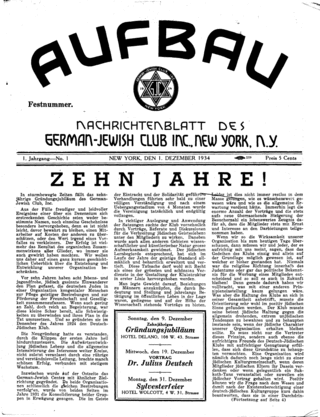
Aufbau is a periodical targeted at German-speaking Jews around the globe. Founded in 1934 in New York City as a newspaper for German Jewish immigrants, it was reinvented in 2004 in Switzerland as a glossy magazine for German-speaking Jews of the 21st century. Hannah Arendt, Albert Einstein, Thomas Mann, and Stefan Zweig wrote for the original publication. Until 2004 it was published in New York City. It is now published in Zürich.
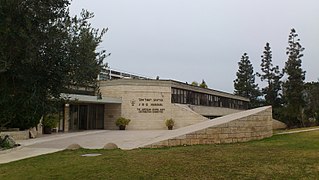
American Jewish Joint Distribution Committee, also known as Joint or JDC, is a Jewish relief organization based in New York City. Since 1914 the organisation has supported Jewish people living in Israel and throughout the world. The organization is active in more than 70 countries.
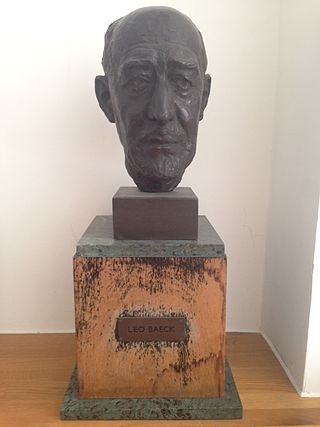
Leo Baeck was a 20th-century German rabbi, scholar, and theologian. He served as leader of Reform Judaism in his native country and internationally, and later represented all German Jews during the Nazi era. After the Second World War, he settled in London, in the United Kingdom, where he served as the chairman of the World Union for Progressive Judaism. In 1955, the Leo Baeck Institute for the study of the history and culture of German-speaking Jewry was established, and Baeck was its first international president. The Leo Baeck Medal has been awarded since 1978 to those who have helped preserve the spirit of German-speaking Jewry in culture, academia, politics, and philanthropy.

Richard Beer-Hofmann was an Austrian dramatist and poet.

The World Union for Progressive Judaism (WUPJ) is the international umbrella organization for the various branches of Reform, Liberal and Progressive Judaism, as well as the separate Reconstructionist Judaism. The WUPJ is based in 40 countries with 1,275 affiliated synagogues, of which 1,170 are Reform, Progressive, or Liberal and 105 Reconstructionist. It claims to represent a total of some 1.8 million people, both registered constituents and non-member identifiers. The WUPJ states that it aims to create common ground between its constituents and to promote Progressive Judaism in places where individuals and groups are seeking authentic, yet modern ways of expressing themselves as Jews. It seeks to preserve Jewish integrity wherever Jews live, to encourage integration without assimilation, to deal with modernity while preserving the Jewish experience, and to strive for equal rights and social justice.
The Reich Representation of German Jews was a Jewish umbrella organization founded in Germany on 17 September 1933. It was established to coordinate and represent the activities of Jewish political and religious groups, with headquarters in Berlin, and provide legal defence in the face of growing persecution of the Nazi era. The organization was constantly being reorganized and remained active in communities nationwide until after the Holocaust. It ceased to exist in June 1943. The Berlin Rabbi Leo Baeck was elected president of the Reichsvertretung with Otto Hirsch acting as its chairman.
Hans Kohn was an American philosopher and historian. He pioneered the academic study of nationalism, and is considered an authority on the subject.
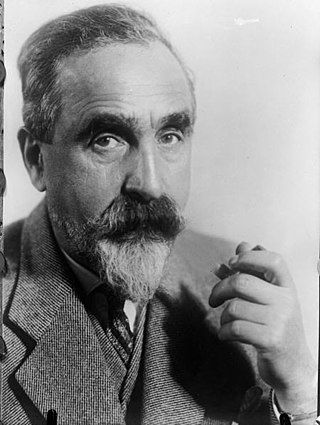
Hermann Struck was a German Jewish artist known for his etchings.

The Fifth Aliyah refers to the fifth wave of the Jewish immigration to Palestine from Europe and Asia between the years 1929 and 1939, with the arrival of 225,000 to 300,000 Jews. The Fifth Aliyah, or fifth immigration wave, began after the comeback from the 1927 economic crisis in Mandatory Palestine and the 1929 Palestine riots, during the period of the Fourth Aliyah.
Jüdischer Kulturbund, or Der Jüdische Kulturbund, was a Cultural Federation of German Jews, established in 1933. It hired over 1300 men and 700 women artists, musicians, and actors fired from German institutions, and grew to about 70,000 members, according to some authors. Saul Friedländer speaks of at least 180,000.

The Leo Baeck Institute, established in 1955, is an international research institute with centres in New York City, London, and Jerusalem that are devoted to the study of the history and culture of German-speaking Jewry. Baeck was its first international president. The Leo Baeck Medal has been awarded since 1978 to those who have helped preserve the spirit of German-speaking Jewry in culture, academia, politics, and philanthropy.
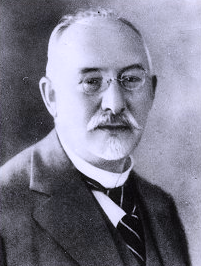
Aron Freimann was a German librarian and historian. He was the son of Israel Meïr Freimann, and grandson, on his mother's side, of the chief rabbi of Altona, Jacob Ettlinger. He attended the Royal Gymnasium of Ostrowo and in 1893 entered the University of Berlin, where he studied history and Oriental languages, devoting himself at the same time to the study of archival and library systems. Parallelly he took courses at the Rabbinical Seminary at Berlin.
The Jewish Restitution Successor Organization Inc. was founded in 1947 in New York by various American and international Jewish organizations. Originally, it was incorporated on May 15, 1947, as the Jewish Restitution Commission, but in 1948 changed its name to the Jewish Restitution Successor Organization at the request of American military authorities.
The United Restitution Organization (URO) was established in 1948 as a legal aid service to assist victims of Nazi persecution living outside Germany in making restitution and indemnification claims against Germany and Austria. The URO has served over 250,000 clients. It helped Jews, Roma, and other victims of Nazi crimes. At its most expansive, the URO maintained 29 offices in 15 countries around the world. British barrister Norman Bentwich was the chairman of the URO board from 1948 until his death in 1971, and Kurt May, a German-born lawyer who had fled the Nazis in 1934 after he defended a leading Social Democrat wrongly accused of being a Communist, served as its director from the early 1950s until 1990.
Florence Mendheim was a New York Public Library branch librarian notable for her undercover surveillance of American Nazi groups in the pre-World War II 1930s. She was the daughter of German-Jewish immigrants and an observant Jew who practiced kosher dietary laws. Her personal papers, including documentation of her spy activities, are housed in the archives of the Leo Baeck Institute in New York.
Jewish Cultural Reconstruction, Inc. was an organization established by the Conference on Jewish Relations in April 1947 to collect and distribute heirless Jewish property in the American occupied zone of Germany after World War II. The organization, originally named the Commission on European Jewish Cultural Reconstruction, was originally proposed in 1944 by Theodor Gaster of the Library of Congress, and one of its cofounders.
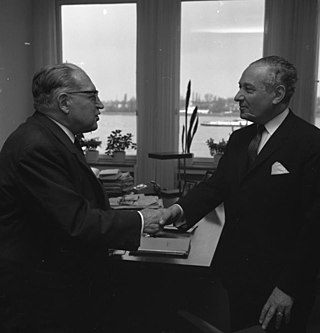
Curt C. Silberman was a German-Jewish and American attorney, community leader, and member of Jewish organizations in both Germany and the United States. Born Kurt Leo Silbermann in Würzburg, Germany, he and his wife Else fled due to the rampant antisemitism of the Nazi era and settled in New Jersey. His legal career in the United States focused on restitution work for the victims of the Nazi government.

The Leo Baeck Institute New York (LBI) is a research institute in New York City dedicated to the study of German-Jewish history and culture, founded in 1955. It is one of three independent research centers founded by a group of German-speaking Jewish émigrés at a conference in Jerusalem in 1955. The other Leo Baeck institutes are Leo Baeck Institute Jerusalem and Leo Baeck Institute London, and the activities of all three are coordinated by the board of directors of the Leo Baeck Institute. It is also a founding partner of the Center for Jewish History, and maintains a research library and archive in New York City that contains a significant collection of source material relating to the history of German-speaking Jewry, from its origins to the Holocaust, and continuing to the present day. The Leo Baeck Medal has been awarded by the institute since 1978 to those who have helped preserve the spirit of German-speaking Jewry in culture, academia, politics, and philanthropy.

Selma Stern-Täubler was one of the first women to become a professional historian in Germany, and the author of a seven-volume work The Prussian State and the Jews, her opus magnum.
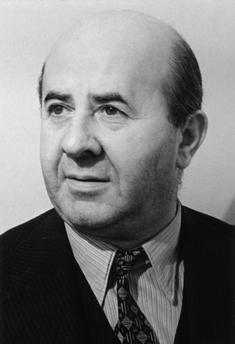
Mark Wischnitzer was a scholar of Jewish history.
References
- 1 2 Teifer, Hermann. “History of the American Federation of Jews from Central Europe.” American Federation of Jews from Central Europe. 50th Anniversary Luncheon. 24 November 1991.
- ↑ Judith Marcus (1999). Surviving the Twentieth Century: Social Philosophy from the Frankfurt School to the Columbia Faculty Seminars. Transaction Publishers. p. 415. ISBN 978-1-4128-3547-3 . Retrieved 24 July 2013.
- ↑ Grossmann, Kurt. Ten years : American Federation of Jews from Central Europe, Inc.: 1941-1951. New York: American Federation of Jews from Central Europe, 1952.
- 1 2 Strauss, H. A. (1971). "The Immigration and Acculturation of the German Jew in the United States of America". The Leo Baeck Institute Yearbook. 16: 63–94. doi: 10.1093/leobaeck/16.1.63 .
- ↑ Eli Lederhendler (2001). New York Jews and the Decline of Urban Ethnicity: 1950-1970. Syracuse University Press. p. 183. ISBN 978-0-8156-0711-3 . Retrieved 30 August 2013.